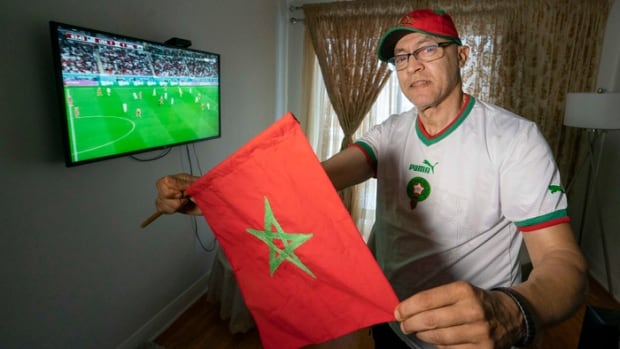Who is your ‘home team’ this World Cup? For many Montrealers, it’s complicated | CBC News
When the World Cup selection process was complete and it was clear that Canada would play Morocco in the group stage, Abdel-hak Boussayri faced a dilemma.
“I had to choose,” said Boussayri, who was born in Morocco but has lived in Montreal for 36 years and now calls Canada home. “Morocco is the country God gave me and Canada is the country that chose me.”
Boussayri’s dilemma is a common one in Montreal and across Canada, particularly among members of the Moroccan, Belgian and Croatian diasporas — teams Canada will face in the group stage — as they find themselves torn between supporting their heritage and their home.
Canada plays Morocco on Dec.1 and members of Montreal’s sizable Moroccan community will gather at the Moroccan Cultural Centre to watch the game. When the two teams faced off in a friendly match in 1994 in Montreal, Boussayri said the Canadian crowd was full of fans supporting Morocco.
On Dec. 1, he predicts the community will again throw its support behind Morocco. Boussayri, a passionate soccer fan who remembers Canada’s last and only appearance in a World Cup in 1986, decided he couldn’t root against the team he has cheered for his entire life.
But support is divided along generational lines in his household. “My children will support Canada, that’s for sure,” he said. “They told me ‘no, I will support Canada, it’s my country.’ I told them ‘I will support Morocco.'”
“If I had a choice, I’d want both teams to qualify for the second round, but it will be unlikely that both Canada and Morocco end up in the second round.”
Julie Bates, a Belgian-Montrealer, said her family is split over whom to support during Canada’s match against Belgium. One of her brothers has chosen Canada, the other has picked Belgium.
“For some of them, Canada is truly their home and they are for Canada,” she said. “I guess everyone likes the underdog scenario. Just like in a movie, it would be great.”
Bates, who has lived in Kingston and Ottawa but has called Montreal home for three years, said she is conflicted but feels a deeper connection to the Belgian national team.
“I think I’ll be for Belgium,” she said, “but I’ll watch with my boyfriend who will be for Canada, so whatever happens I tell myself I will be happy.
“If Canada made it really far, I would be truly happy.”

Marko Piperkovic, a Montrealer born in Canada to Croatian parents, will be cheering for Croatia and for Canada during the World Cup, but when they face off on Nov. 27, he will be wearing a team Croatia jersey.
“The heart is with Croatia, I can’t go against my heart,” he said. “I was born and raised in Canada but in the household, it was fully Croatian and (we were) fully active in the Croatian community in Montreal.… The relationship, the bond is extremely strong with the Croatian heritage and the Croatian homeland.”
Piperkovic’s informal polling of the Croatian community in Montreal, which he described as small but close-knit, shows that most of them will also be rooting for Croatia. He thinks it’s because Canada’s men’s team has had little presence on the international scene until recently. Croatia, by contrast, has consistently punched above its weight as a soccer-playing nation.

Piperkovic has rooted for the Croatian squad since 1998 when the country played in its first World Cup as an independent state. He watched the team overachieve to come third at that World Cup and make the finals in 2018, which he remembers as being “like a dream.”
He has had no similar experiences rooting for Canada, which has not qualified for the World Cup in his lifetime.
“Canada wasn’t that present in the soccer world over the last five, 10 years,” he said. “Maybe there wasn’t a reason to cheer for them. Maybe we never built that relationship with a Canadian team.”
He also credits his support for Croatia to the sense of connection he feels to his parents’ roots and culture — a key part of his identity.
“When you’re far from the homeland, the attachment gets stronger,” he said.
Still, Piperkovic would celebrate any success by the young Canadian team, who are widely recognized as underdogs.
“We’re Canadians,” Piperkovic said, “and we’re happy that Canada succeeds.”
For all the latest Sports News Click Here

